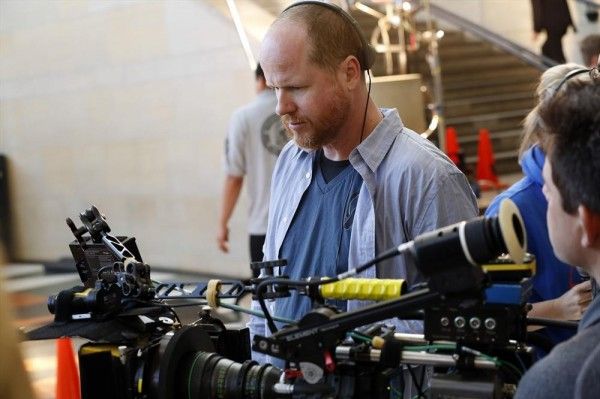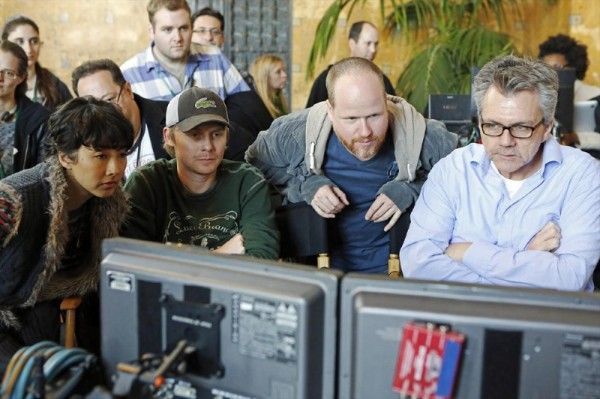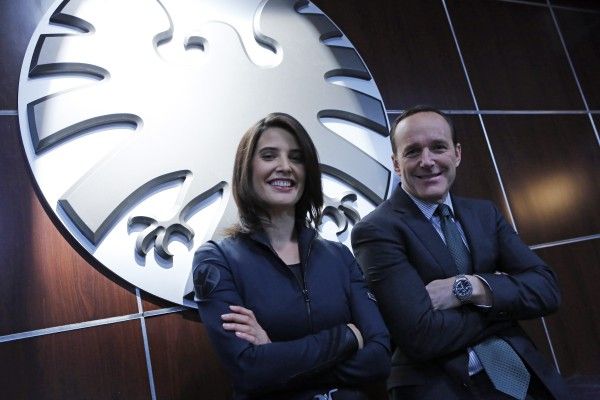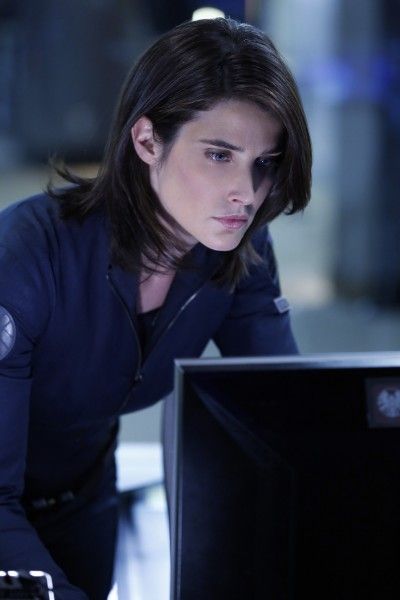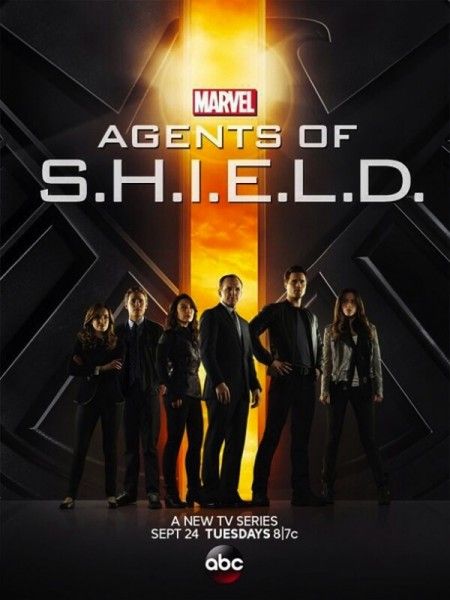One of the most highly anticipated showsof the upcoming fall TV season is Marvel’s Agents of S.H.I.E.L.D. Clark Gregg reprises his role as Agent Phil Coulson from Marvel’s feature films, as he assembles a small, highly select group of Agents, who together will investigate the new, the strange and the unknown, across the globe, in order to protect the ordinary from the extraordinary. The show also stars Ming-Na Wen, Brett Dalton, Iain De Caestecker, Elizabeth Henstridge and Chloe Bennet.
While at the ABC portion of the TCA Press Tour, executive producer Joss Whedon talked about the trust they have in making this show, how refreshing it is to be part of a series where he’s not the primary showrunner, the format they’re looking to follow on a weekly basis, why it’s important for this team to not have superpowers, whether or not this was always the plan for Agent Coulson, that the mystery of Coulson will unravel throughout the season, whether more actors from the Marvel movies could make appearances on the show, how often they’ll tie things into the world of the films, and what all of his work with Marvel means for a Dr. Horrible sequel. Check out what the had to say after the jump, and be aware that there are some spoilers.
Question: Are you getting a lot of creative freedom with this show?
JOSS WHEDON: We’ve got trust, which is different than freedom. My collaboration with Marvel on the movie was pretty extraordinary and, for me, unprecedented. It wasn’t a question of them getting out of the way. We really worked that story together. ABC and Marvel have been very active in making sure the show is what they want for their company and their network and their audiences and, at the same time, they’re very supportive of the vision that we first laid out to them. The most important thing is that we all are trying to make the same show. It’s not really about “Oh, we’re past them, and we don’t want have to deal with them.” We’re all on the same page, which has occasionally not happened for me.
Is it weird or refreshing to be part of a TV show where you’re not the primary showrunner?
WHEDON: It is weirdly refreshing. It was very important to me to get [Jed and Maurissa]. When we did Dr. Horrible, and even when we worked on Dollhouse, we very much had that finishing each other’s sentences thing. And not just Jed [Whedon], but Maurissa [Tancharoen], as well. I’m reading every script and every story, and giving notes and rewrites. I’m doing all of the stuff, but I just can’t be in the room, every day. Knowing that I have a group who’s going to push it forward and share this hard to convey idea of exactly how I want the show to feel, is a great relief. It’s why you do television. You build these families. You find people like Jed, Drew Goddard and Tim Minear, who are going to take your vision and not just further it, but enhance it in ways you couldn’t see coming.
What sort of format are you looking to follow, on a weekly basis?
WHEDON: There’s not going to be some new hero, every week. There could be a device. There could be a mystery. There are so many aspects to what’s happened, since everybody in the world found out that there is a superhero team and there were aliens that invaded New York, and we want to be able to change it up, every week. We want to be able to deal with every aspect – the spy stuff, the hero stuff, the heartfelt stuff, the humor. We want to make sure that you get something that feels a little bit different, so it’s not just turkey, every day.
How important is it for the members of this team to not be super-powered?
WHEDON: The thing that appealed to me about this show, from the very beginning, is the idea of the people who don’t have the superpowers, who didn’t get the hammer and who didn’t, get the super soldier serum, and the idea that everybody matters. There’s very much a sense of, “Well, what about the rest of us? How do we cope with this?” And so, yeah, it was important that our core team, while they are extraordinary and incredibly good at what they do and ridiculously attractive, they don’t fall under the category of super.
When you filmed Coulson’s death scene in The Avengers, was that his death scene, or did you have something percolating for the character, down the line?
WHEDON: I absolutely killed him. It was not percolating. Kevin Feige told me before I took the gig, “You gotta kill Coulson.” And I understood why, but I said, “You’re taking the rap because I get a lot of heat for that stuff.”
In the pilot you allude to some things with Agent Coulson. Will that mystery unravel through the season?
WHEDON: No, we’re never going to mention it again. Yes, we will be dealing with the issue, obviously. That will be part of the thread throughout the story.
What do you say to people who suspect that Coulson is a life model decoy?
WHEDON: I don’t say anything ‘cause I’m not going to confirm or deny anybody’s ideas. I’ve heard a dozen ideas, or more than a dozen. Somebody, at some point, is going to be right, but I’m never going to say when that happens. I’m not even going to blink.
Could Samuel L. Jackson and Cobie Smulders make appearances on this show?
WHEDON: We’ve seen Cobie on the show. We would love to see her again. We would love to see Sam, too, but he’s a movie star and a workaholic, so whether or not he’ll make time for us, I can’t say yet. I hope so.
Are you prepared to make calls to anyone from the films, to ask them to come on the show?
WHEDON: I’m prepared, insomuch as I think it’s a great idea for the show and a perfectly good idea for them. I’m not going to go begging, and I’m not going to use up favors that I need for The Avengers 2. The DNA of the show is the show. Those guys would be a delightful bonus, but we’re not building our arcs around them. We’ll just see what happens.
Wouldn’t it overwhelm the TV show a bit to have the movie characters appear?
WHEDON: Well, the good thing about the universe is that they’re superstars in that universe, so if they showed up and they overbalanced it slightly, it would actually make sense. That’s how people would react to them, in the universe of the show. So, I don’t think that’s a problem. But, I do think it’s a problem, if you have them too regularly, and then people are just wondering, “When do I get to see the movie star again?,” instead of concentrating on these guys.
You’re known for taking chances with form and structure. Are you hoping to do some of that with this show, and is that something you can even do within the Marvel universe?
WHEDON: We are not out to pull stunts. We are not out to go, “This will be black-and-white. This will be us having a laugh.” It’s always going to come from the show. Buffy lent itself to a musical because it was so hyperbolically emotional and so over-the-top in its mythos. None of my other shows really have. But, there is an element of absurdity in the Marvel universe that’s come from back when I was reading the comics in the ‘70s, that is satirical and bizarre. The fact that we’ll be able to tap into that will keep the show from feeling too self-important or dry. We definitely want to push our boundaries and give people new stuff, but we’re not just looking for a cool angle. It’s always going to be built from the characters and their stories.
How often do you think you’ll be able to direct an episode?
WHEDON: I don’t think it’ll happen again for the next couple of years because I’m getting behind another camera, in another country. But, we have some directors that we’ve worked with before, and that we trust very much. The producers are always on set. We’re very, very careful about making sure that what we have in the script is what shows up on screen.
What is it like doing the biggest comic book movie of all time, and now a TV show?
WHEDON: It doesn’t suck. I’m not going to lie. It’s pretty gratifying.
Did you ever think, when you were a kid, that you’d be doing this?
WHEDON: Yeah, of course I did! It was that or get a job.
Making the transition from trying to get people to watch your shows to having the biggest movie, and now this highly anticipated show, what’s it been like, personally, to go from that to this?
WHEDON: At the end of the day, I had to spend a lot of time selling Much Ado. I want people to see everything, and you can’t guarantee that they will just because a show has hype. For me, my biggest concern is that I’m looking at the next script, and the script after that, and the script after that, and making sure that we keep our game up because, if people are watching, I want to make sure that they get everything they can.
Will there be any synergy between the show and the feature films?
WHEDON: There will be as much as we can allow. We’re still working that out. It’s a fluid process. The important thing is that it’s a fun opportunity, but it’s not the reason behind the show. We don’t want just to be an Easter egg farm. We want people to come back because of [this cast], and not because of some connection to the movie universe. This show has to work for people who aren’t going to see those movies, and haven’t seen them before.
How do you decide the movie tie-ins that you want to with the TV show?
WHEDON: A lot of it comes from talking to the Marvel movie people. We say, “Can we do this? Will this help? Will this tie together? Will this somehow blunt them?” We don’t want to hurt the movies, at all. With Extremis, we said, “This will give us a ticking clock. This will be useful for us.” And they were excited. They said, “That’s great! It’ll build on mythology that we just created, and people will get something out of that.” On other occasions they’ll be like, “Don’t touch that. We need that for the movie.” And I’d like to protect the movies, too, particularly the last one in Phase Two. I hear it’s going to be wonderful!
What is different about a show of this scale versus a motion picture?
WHEDON: At the end of the day, it’s people. Somebody said, “How are you going to do this again? It was so big.” The question is never, “How big can it be?” The question is, “How small can it be and still have people showing up and really caring?” Some of my favorite issues of comics, when I was a kid, were issues where people just sat around talking, and the fight wasn’t coming until the next issue. It was getting into character, like that. I’m not really worried about the scale.
When Much Ado turned into an indie phenomenon, what was your reaction?
WHEDON: We definitely made the movie thinking, “Maybe we’re just going to show this to each other at parties,” but it was a movie that came completely from passion. The fact that other people responded to that passion, I’m surprised every time that happens, and absolutely delighted. In this case, I’m a little more surprised because black and white Shakespeare home movies don’t usually get this kind of response. But, I’m just grateful.
What does all this Marvel development mean for Dr. Horrible 2?
WHEDON: It pushes it. S.H.I.E.L.D. took its spot, and that’s just the sad reality.
Do you have the goal of getting back to TV and doing entirely your own thing, once your time in the Marvel universe is done?
WHEDON: The goal is never about the medium. It’s always about the next story. It’s always about the thing I haven’t done before. It’s about learning, or it’s about becoming better, and it’s about whatever story grabs hold of me. Sometimes I don’t even know which medium is best for that story, but I usually go, “Well, that’s a TV show. Well, that’s a movie.” I like not knowing what’s next. It’s all just making people care about people. So, I have no idea what the next one will be. I don’t have a particular ambition in any medium. I just want to keep telling stories. If somebody pays me, that’s also good.
Marvel’s Agents of S.H.I.E.L.D. premieres on ABC on September 24th.

